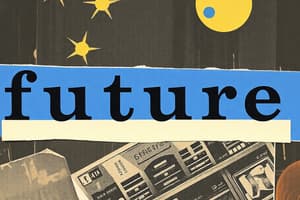Podcast
Questions and Answers
What is the definition of simple future tense?
What is the definition of simple future tense?
Simple future tense refers to actions or events that will happen in the future. It is formed by using the auxiliary verb 'will' or 'shall' followed by the base form of the main verb.
Give an example sentence using simple future tense.
Give an example sentence using simple future tense.
I will visit my grandparents next week.
How is simple future tense different from other future tenses?
How is simple future tense different from other future tenses?
Simple future tense is used to express a simple statement of the future, while other future tenses may indicate uncertainty, possibility, or intention.
By this time next year, I ______ my own business.
By this time next year, I ______ my own business.
The movie starts at 7:00, so we ______ to be there at least 15 minutes early.
The movie starts at 7:00, so we ______ to be there at least 15 minutes early.
I promise I ______ you as soon as I finish my work.
I promise I ______ you as soon as I finish my work.
Flashcards are hidden until you start studying
Study Notes
Simple Future Tense
- Definition: The simple future tense is used to express an action that will occur in the future, indicating a future event or action that is not yet certain or planned.
- Example sentence: I will go to the party tonight.
Difference from Other Future Tenses
- The simple future tense is different from the future perfect tense, which expresses an action that will be completed at a specific point in the future.
- It is also different from the future continuous tense, which expresses an action that will be in progress at a specific point in the future.
Filling in the Blanks
- By this time next year, I will have started my own business.
- The movie starts at 7:00, so we will be there at least 15 minutes early.
- I promise I will call you as soon as I finish my work.
Studying That Suits You
Use AI to generate personalized quizzes and flashcards to suit your learning preferences.




